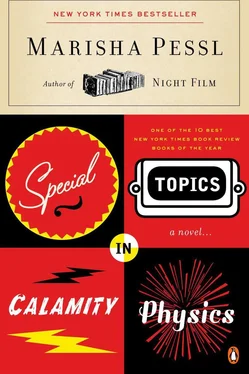“Let her do that one, too. You don’t mind do you, Blue?”
The turning point came at Leroy’s. Right in the middle of his living room crowded with porcelain Dalmatian miniatures, I started to cry — though I didn’t know why I decided to cry on that particular occasion; Leroy, Jessica and Schyler had only assigned me one out of every four questions on the Study Sheet. They began to chant in high-pitched, saccharine voices, “Oh, my God, what’s wrong? ” causing the three live Dalmatians to run into the living room, circling and barking, and Leroy’s mother emerged from the kitchen wearing pink dishwashing gloves, shouting, “Leroy, I told you not to egg them on!” I ran out of the house, all the way home, about six miles. Leroy never returned my supplemental textbooks.
“So how do you know Charles?” asked Sal Mineo next to me as we reached the glass doors.
“I don’t know Charles,” I said.
“Well, you’re lucky because everyone wants to know him.”
“Why?”
Sal looked troubled, then shrugged and said in a soft, regretful voice: “He’s royalty.” Before I could ask what that meant, he skipped down the cement steps and disappeared into the crowd. Sal Mineos were always talking in spongy voices and making comments that were as vague as the outline of an angora sweater. Their eyes weren’t like everyone else’s but had enlarged tear glands and extra optic nerves. I thought about hurrying after him, letting him know by the end of the movie he’d be acknowledged as a character of great sensitivity and pathos, an archetype of all that was lost and injured about his generation, but would be gunned down by trigger-happy police if he wasn’t careful, if he didn’t come to an understanding about himself and who he was.
Instead, I’d spotted the royal: Prince Charles, backpack slung over his shoulder, a playful grin, was striding quickly across the courtyard toward a tall, dark-haired girl wearing a long brown wool coat. He snuck up behind her, threw his arm around her neck with an “Ah-haahhhh!” She shrieked, and then, when he jumped in front of her, laughed. It was one of those chime-laughs that knifed cleanly through the morning, through the tired muttering of all the other kids, hinting this person had never known embarrassment or awkwardness, that even her grief would be gorgeous in the off chance she ever experienced it. Obviously, this was his dazzling girlfriend, and they were one of those tan, hair-tossing Blue Lagoon couples (one per every high school) who threatened to destroy the bedrock of the chaste educational community simply by the muggy way they looked at each other in the halls.
Students observed them with wonder, like they were fast-sprouting pinto beans in a clammy covered aquarium. Teachers — not all, but some — stayed awake all night hating them, because of their weird grown-up youth, which was like gardenias blooming in January, and their beauty, which was both stunning and sad as racehorses, and their love everyone except them knew wouldn’t last. I deliberately stopped staring (you’d seen one version of Blue Lagoon , you’d seen them all), but when I’d walked to Hanover and pulled open the side door, I nonchalantly glanced back in their direction and realized with shock, I’d made a major blunder in observation.
Charles now stood at a respectful distance (though the look on his face was still like a kitten staring at string) and she was talking to him with a teacherly frown (a frown all decent teachers mastered; Dad had one that instantly turned his forehead into rippled potato chips). She wasn’t a student. In fact, I had no idea how I, given that stance, could possibly have mistaken her for one. A hand on her hip, chin tilted as if trying to make out a falcon circling above the Commons, she wore brown leather boots that resembled Italy and dug the heel of one into the pavement, grinding out an invisible cigarette.
It was Hannah Schneider.
When Dad was in a Bourbon Mood, he’d make a five-minute toast to old Benno Ohnesorg, shot by Berlin police at a student rally in 1967. Dad, nineteen years old, was next to him: “He was standing on my shoelace when he went down. And my life — asinine things I’d wasted time worrying about — my marks, my standing, my girl —it all congealed when I looked into his dead eyes.” Here, Dad fell silent and sighed (though it wasn’t so much a sigh as a Herculean exhale one could use to play a bagpipe). I could smell the alcohol, a strange hot smell, and when I was little I guessed it was what the Romantic poets smelled of, or those nineteenth-century Latin generals Dad enjoyed talking about who “surfed in and out of power on waves of revolution and resistance juntas.”
“And that was my Bolshevik moment, so to speak,” he said. “When I decided to storm the Winter Palace. If you’re lucky, you’ll have one.”
And every now and then, after Benno, Dad might go on to expound upon one of his most beloved principles, that of the Life Story, but only if he didn’t have a lecture to compose, or wasn’t midway through a chapter in a new book on war written by someone he’d known at Harvard. (He’d dissect it like a gung-ho coroner hoping to find evidence of foul play: “Here it is, sweet! Evidence Lou Swann’s a hack! Counterfeit! Listen to this dung! ‘In order to be successful, revolutions require a highly visible armed force to unleash widespread panic; this violence must then gain momentum, escalating into out-and-out civil war.’ Fool wouldn’t know civil war if it bit him on the ass!”)
“Everyone is responsible for the page-turning tempo of his or her Life Story,” Dad said, scratching his jaw thoughtfully, arranging the limp collar of his chambray shirt. “Even if you have your Magnificent Reason, it could still be dull as Nebraska and that’s no one’s fault but your own. Well, if you feel it’s miles of cornfields, find something to believe in other than yourself, preferably a cause without the stench of hypocrisy, and then charge into battle. There’s a reason they still put Che Guevara on T-shirts, why people still whisper about The Nightwatchmen when there’s been no evidence of their existence for twenty years.
“But most critically, sweet, never try to change the narrative structure of someone else’s story, though you will certainly be tempted to, as you watch those poor souls in school, in life, heading unwittingly down dangerous tangents, fatal digressions from which they will unlikely be able to emerge. Resist the temptation. Spend your energies on your story. Reworking it. Making it better. Increasing the scale, the depth of content, the universal themes. And I don’t care what those themes are — they’re yours to uncover and stand behind — so long as, at the very least, there is courage. Guts. Mut , in German. Those around you can have their novellas, sweet, their short stories of cliché and coincidence, occasionally spiced up with tricks of the quirky, the achingly mundane, the grotesque. A few will even cook up Greek tragedy, those born into misery, destined to die in misery. But you, my bride of quietness, you will craft nothing less than epic with your life. Out of all of them, your story will be the one to last.”
“How do you know?” I always asked, and when I spoke it sounded tiny and uncertain, compared to Dad.
“I just know,” he said simply, and then closed his eyes, which indicated that he didn’t want to talk anymore.
The only sound in the room was the ice melting his glass.
Knowing that Charles was on familiar terms with Hannah Schneider tempted me a little, but in the end I decided not to meet him at the Scratch.
Читать дальше












